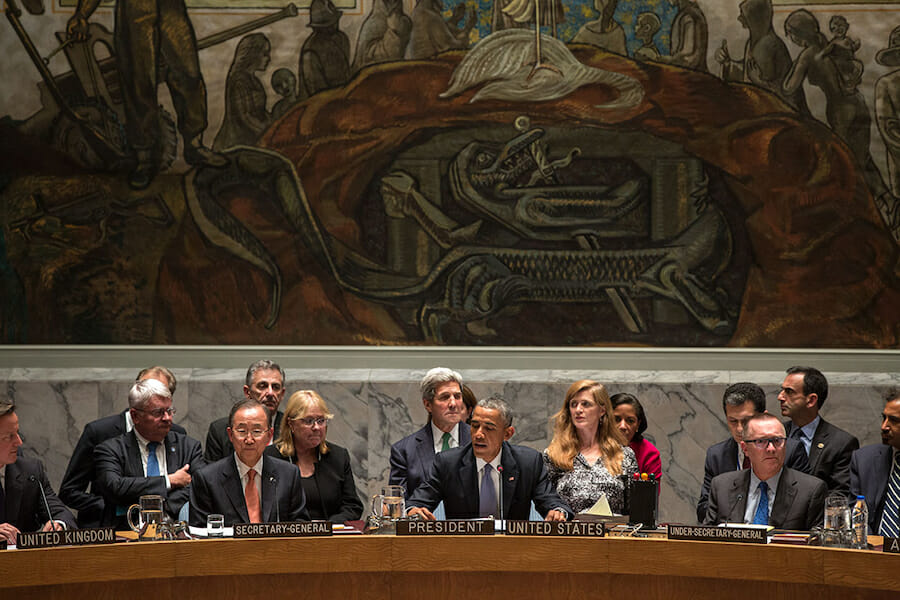
The UN Security Council’s Biggest Hypocrites
While much attention has rightfully been given to the Russian and Chinese veto of a very timid UN Security Council resolution on the brutal crackdown by Syrian President Bashar al-Assad’s regime against pro-democracy protesters, little has been said of the Council’s biggest hypocrites – those countries that chose to abstain. Though the Syrian people and the international community can be – in the words of Susan Rice, the U.S. Ambassador to the UN– “outraged” at Russia and China, their vote comes as no surprise.
Since the beginning of the Arab Spring, both Moscow and China have been fearful of similar uprisings against their own governments. They reticently ceded to allow the Security Council to act on Libya when pressured by the international community, and have since balked at the precedent set by NATO action against Gaddafi.
In addition, Moscow lost approximately $4 billion dollars in contracts due to the UN arms embargo on Libya. Syria was simply a bridge too far. For months, Beijing and Moscow have stymied Security Council efforts against Syria. Meanwhile, the Kremlin has been busy making up lost dollars by continuing to sell weapons to al-Assad, one of the Russian defense industry’s best clients.
Acquiescing to the UN resolution would have cemented a precedent against government crackdowns on popular uprisings everyone knew Moscow and Beijing would rather see slowly fall into the dustbin of history. On the other hand, India, South Africa, Brazil, and Lebanon had the opportunity to support the Syrian people by joining the international community in condemning Assad’s murderous acts. Instead, they abstained.
Despite having overthrown colonialism and military autocracies, despite having produced heroes, such as Gandhi and Mandela, who inspired movements for democracy and civil rights around the world, they chose to cowardly abstain. Their abstention told the world that though they disagree with Assad’s crackdown, they are unwilling to support the Syrian people’s demands for freedom and rights.
Their vote also further legitimized the Russian and Chinese veto which, to their credit, at least reflected their true self-interested conviction for tyranny. Though India and South Africa expressed legitimate concern that the Security Council resolution could be used as a pretext for foreign military intervention in Damascus, the resolution sponsors went to great lengths to accommodate their skeptical positions. The drafted resolution clearly excluded military intervention as a means to resolve the Syrian crisis.
India’s, Brazil’s and South Africa’s ultimate abstention, however, comes as no surprise. Their vote reflects the more assertive foreign policy of the BRICS, an increasingly formal political grouping of emerging economies consisting of Brazil, Russia, India, China and South Africa. Much like Turkey in the Middle East, Brazil, India and South Africa are ever more asserting their regional leadership and showing the world, and in particular Europe and the United States, that they no longer follow their rules.
This approach also reflects a more pragmatic foreign policy that puts self-interests before moral obligations. But unlike its regional counterparts, Turkey recognizes that it can advance its status and interests by also adhering to its moral obligations. Indeed, Istanbul, who once courted Syria, has chosen to support the Syrian people and will soon adopt sanctions against Damascus.
Despite their grandiose aspirations and efforts in recent years to expand the UN Security Council, last week’s vote demonstrates that the the world’s largest democracy and the leading democracies of Africa and South America are not ready to join the Council as permanent members. Charged with the maintenance of international peace and security, the Security Council’s vote on Syria showed the international community that India, South Africa and Brazil are willing to abrogate their moral responsibility to prevent further bloodshed out of self-interest. Like Turkey, they should realize that Syria’s and their interests would be better served by supporting the same demands for freedom and civil rights that make India, South Africa and Brazil the great democracies they are today.
The unwillingness of India, South Africa and Brazil to stand up to their moral obligations will not fall on deaf ears however. The Syrian people and the international community will not forget their hypocrisy. With time, the Syrian people’s burning yearn for freedom and civil rights will prove these hypocrites wrong.
